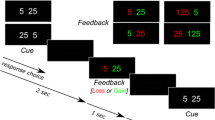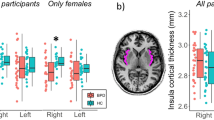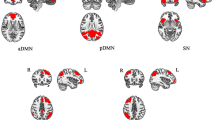Abstract
Behavioral and neuroimaging studies in patients with borderline personality disorder (BPD) have associated orbitofrontal cortex (OFC) dysfunction with distinct symptom clusters such as impulsivity. It is unclear, however, whether abnormal patterns of OFC activity are also present during resting-state conditions and whether OFC dysfunction is specifically associated with impulsivity in BPD. This study tested the hypothesis that BPD patients would exhibit changes of OFC baseline perfusion and explored the relationship between regional cerebral blood flow and distinct BPD symptom clusters, such as impulsivity, dissociation tension and depressive symptoms. Using continuous arterial spin labeling magnetic resonance imaging at 3 Tesla, we investigated 16 women with BPD according to DSM-IV criteria and 16 healthy female control participants during resting-state conditions. Between-group comparisons were conducted using an analysis of variance (p < 0.05 cluster corrected). Compared to controls, BPD patients exhibited decreased blood flow in the medial OFC, whereas increased blood flow was found in the left and right lateral OFC. Correlation analyses revealed a positive relationship between medial and lateral orbitofrontal blood flow and impulsivity scores, whereas measures of dissociation tension and depression did not exhibit a significant correlation with OFC perfusion. These data suggest that dysfunction of medial and lateral regions of the OFC could specifically mediate symptoms of impulsivity in BPD.


Similar content being viewed by others
References
Lieb K, Zanarini MC, Schmahl C, Linehan MM, Bohus M (2004) Borderline personality disorder. Lancet 364:453–461
Silbersweig D, Clarkin JF, Goldstein M, Kernberg OF, Tuescher O, Levy KN, Brendel G, Pan H, Beutel M, Pavony MT, Epstein J, Lenzenweger MF, Thomas KM, Posner MI, Stern E (2007) Failure of frontolimbic inhibitory function in the context of negative emotion in borderline personality disorder. Am J Psychiatry 164:1832–1841
Salavert J, Gasol M, Vieta E, Cervantes A, Trampal C, Gispert JD (2011) Fronto-limbic dysfunction in borderline personality disorder: a 18F-FDG positron emission tomography study. J Affect Disord 131:260–267
Diaz-Marsa M, Carrasco JL, Lopez-Ibor M, Moratti S, Montes A, Ortiz T, Lopez-Ibor JJ (2011) Orbitofrontal dysfunction related to depressive symptomatology in subjects with borderline personality disorder. J Affect Disord 134:410–415
Schulze L, Domes G, Kruger A, Berger C, Fleischer M, Prehn K, Schmahl C, Grossmann A, Hauenstein K, Herpertz SC (2011) Neuronal correlates of cognitive reappraisal in borderline patients with affective instability. Biol Psychiatry 69:564–573
Lis E, Greenfield B, Henry M, Guile JM, Dougherty G (2007) Neuroimaging and genetics of borderline personality disorder: a review. J Psychiatry Neurosci 32:162–173
Schmahl C, Bremner JD (2006) Neuroimaging in borderline personality disorder. J Psychiatr Res 40:419–427
Mauchnik J, Schmahl C (2010) The latest neuroimaging findings in borderline personality disorder. Curr Psychiatry Rep 12:46–55
Rolls ET (1996) The orbitofrontal cortex. Philos Trans R Soc Lond B Biol Sci 351:1433–1443; discussion 1443–1434
Rolls ET (2004) The functions of the orbitofrontal cortex. Brain Cogn 55:11–29
Kringelbach ML, Rolls ET (2004) The functional neuroanatomy of the human orbitofrontal cortex: evidence from neuroimaging and neuropsychology. Prog Neurobiol 72:341–372
Zald DH, Andreotti C (2011) Neuropsychological assessment of the orbital and ventromedial prefrontal cortex. Neuropsychologia 48:3377–3391
Lyoo IK, Han MH, Cho DY (1998) A brain MRI study in subjects with borderline personality disorder. J Affect Disord 50:235–243
Tebartz van Elst L, Hesslinger B, Thiel T, Geiger E, Haegele K, Lemieux L, Lieb K, Bohus M, Hennig J, Ebert D (2003) Frontolimbic brain abnormalities in patients with borderline personality disorder: a volumetric magnetic resonance imaging study. Biol Psychiatry 54:163–171
de la Fuente JM, Lotstra F, Goldman S, Biver F, Luxen A, Bidaut L, Stanus E, Mendlewicz J (1994) Temporal glucose metabolism in borderline personality disorder. Psychiatry Res 55:237–245
Soloff PH, Meltzer CC, Becker C, Greer PJ, Kelly TM, Constantine D (2003) Impulsivity and prefrontal hypometabolism in borderline personality disorder. Psychiatry Res 123:153–163
Vollm B, Richardson P, McKie S, Elliott R, Dolan M, Deakin B (2007) Neuronal correlates of reward and loss in cluster B personality disorders: a functional magnetic resonance imaging study. Psychiatry Res 156:151–167
Berlin HA, Rolls ET, Iversen SD (2005) Borderline personality disorder, impulsivity, and the orbitofrontal cortex. Am J Psychiatry 162:2360–2373
Lee AK, Jerram M, Fulwiler C, Gansler DA (2011) Neural correlates of impulsivity factors in psychiatric patients and healthy volunteers: a voxel-based morphometry study. Brain Imaging Behav 5:52–64
Price JL (2007) Definition of the orbital cortex in relation to specific connections with limbic and visceral structures and other cortical regions. Ann N Y Acad Sci 1121:54–71
Buxton RB, Frank LR (1997) A model for the coupling between cerebral blood flow and oxygen metabolism during neural stimulation. J Cereb Blood Flow Metab 17:64–72
Floyd TF, Ratcliffe SJ, Wang J, Resch B, Detre JA (2003) Precision of the CASL-perfusion MRI technique for the measurement of cerebral blood flow in whole brain and vascular territories. J Magn Reson Imaging 18:649–655
Petersen ET, Zimine I, Ho YC, Golay X (2006) Non-invasive measurement of perfusion: a critical review of arterial spin labelling techniques. Br J Radiol 79:688–701
Asllani I, Habeck C, Scarmeas N, Borogovac A, Brown TR, Stern Y (2008) Multivariate and univariate analysis of continuous arterial spin labeling perfusion MRI in Alzheimer’s disease. J Cereb Blood Flow Metab 28:725–736
Wang J, Zhang Y, Wolf RL, Roc AC, Alsop DC, Detre JA (2005) Amplitude-modulated continuous arterial spin-labeling 3.0-T perfusion MR imaging with a single coil: feasibility study. Radiology 235:218–228
Theberge J (2008) Perfusion magnetic resonance imaging in psychiatry. Top Magn Reson Imaging 19:111–130
Wang DJ, Chen Y, Fernandez-Seara MA, Detre JA (2011) Potentials and challenges for arterial spin labeling in pharmacological magnetic resonance imaging. J Pharmacol Exp Ther 337:359–366
Goethals I, Audenaert K, Jacobs F, Van den Eynde F, Bernagie K, Kolindou A, Vervaet M, Dierckx R, Van Heeringen C (2005) Brain perfusion SPECT in impulsivity-related personality disorders. Behav Brain Res 157:187–192
Juengling FD, Schmahl C, Hesslinger B, Ebert D, Bremner JD, Gostomzyk J, Bohus M, Lieb K (2003) Positron emission tomography in female patients with borderline personality disorder. J Psychiatr Res 37:109–115
Patton JH, Stanford SM, Barratt ES (1995) Factor structure of the Barratt impulsiveness scale. J Clin Psychol 51:768–774
Beck AT, Ward CH, Mendelson M, Mock J, Erbaugh J (1961) An inventory for measuring depression. Arch Gen Psychiatry 4:561–571
Stiglmayr C, Schimke P, Wagner T, Braakmann D, Schweiger U, Sipos V, Fydrich T, Schmahl C, Ebner-Priemer U, Kleindienst N, Bischkopf J, Auckenthaler A, Kienast T (2010) Development and psychometric characteristics of the dissociation tension scale. J Pers Assess 92:269–277
Matsuo K, Nicoletti M, Nemoto K, Hatch JP, Peluso MA, Nery FG, Soares JC (2009) A voxel-based morphometry study of frontal gray matter correlates of impulsivity. Hum Brain Mapp 30:1188–1195
Wolf RC, Sambataro F, Vasic N, Schmid M, Thomann PA, Bienentreu SD, Wolf ND (2011) Aberrant connectivity of resting-state networks in borderline personality disorder. J Psychiatry Neurosci 36:100150
Bohus M, Kleindienst N, Limberger MF, Stieglitz RD, Domsalla M, Chapman AL, Steil R, Philipsen A, Wolf M (2009) The short version of the borderline symptom list (BSL-23): development and initial data on psychometric properties. Psychopathology 42:32–39
Hamilton M (1960) A rating scale for depression. J Neurol Neurosurg Psychiatry 23:56–62
Chen Y, Wang DJ, Detre JA (2011) Test-retest reliability of arterial spin labeling with common labeling strategies. J Magn Reson Imaging 33:940–949
Paiva F, Tannus A, Silva A (2007) Measurement of cerebral perfusion territories using arterial spin labeling. NMR Biomed 20:633–642
Detre JA, Wang J (2002) Technical aspects and utility of fMRI using BOLD and ASL. Clin Neurophysiol 113:621–634
Wang J, Li L, Roc AC, Alsop DC, Tang K, Butler NS, Schnall MD, Detre JA (2004) Reduced susceptibility effects in perfusion fMRI with single-shot spin-echo EPI acquisitions at 1.5 Tesla. Magn Reson Imaging 22:1–7
Wang J, Aguirre GK, Kimberg DY, Detre JA (2003) Empirical analyses of null-hypothesis perfusion FMRI data at 1.5 and 4 T. NeuroImage 19:1449–1462
Wolf RC, Gron G, Sambataro F, Vasic N, Wolf ND, Thomann PA, Saft C, Landwehrmeyer GB, Orth M (2011) Magnetic resonance perfusion imaging of resting-state cerebral blood flow in preclinical Huntington’s disease. J Cereb Blood Flow Metab 31:1908–1918
Tzourio-Mazoyer N, Landeau B, Papathanassiou D, Crivello F, Etard O, Delcroix N, Mazoyer B, Joliot M (2002) Automated anatomical labeling of activations in SPM using a macroscopic anatomical parcellation of the MNI MRI single-subject brain. Neuroimage 15:273–289
Forman SD, Cohen JD, Fitzgerald M, Eddy WF, Mintun MA, Noll DC (1995) Improved assessment of significant activation in functional magnetic resonance imaging (fMRI): use of cluster-size threshold. Magn Reson Med 33:636–647
Brett M, Anton J-L, Valabregue R, Poline JB (2002) Region of interest analysis using an SPM toolbox [abstract]. In: 8th international conference on functional mapping of the human brain, Sendai, Japan. Available on CD-ROM in NeuroImage, vol 16, No 2, 2002
Benjamini Y, Yekutieli D (2001) The control of the false discovery rate in multiple testing under dependency. Ann Statist 29:1165–1188
Kraus A, Valerius G, Seifritz E, Ruf M, Bremner JD, Bohus M, Schmahl C (2009) Script-driven imagery of self-injurious behavior in patients with borderline personality disorder: a pilot FMRI study. Acta Psychiatr Scand
Lanius RA, Williamson PC, Bluhm RL, Densmore M, Boksman K, Neufeld RW, Gati JS, Menon RS (2005) Functional connectivity of dissociative responses in posttraumatic stress disorder: a functional magnetic resonance imaging investigation. Biol Psychiatry 57:873–884
Ludascher P, Valerius G, Stiglmayr C, Mauchnik J, Lanius RA, Bohus M, Schmahl C (2010) Pain sensitivity and neural processing during dissociative states in patients with borderline personality disorder with and without comorbid posttraumatic stress disorder: a pilot study. J Psychiatry Neurosci 35:177–184
Schmahl C, Bohus M, Esposito F, Treede RD, Di Salle F, Greffrath W, Ludaescher P, Jochims A, Lieb K, Scheffler K, Hennig J, Seifritz E (2006) Neural correlates of antinociception in borderline personality disorder. Arch Gen Psychiatry 63:659–667
Elliott R, Dolan RJ, Frith CD (2000) Dissociable functions in the medial and lateral orbitofrontal cortex: evidence from human neuroimaging studies. Cereb Cortex 10:308–317
Noonan MP, Walton ME, Behrens TE, Sallet J, Buckley MJ, Rushworth MF (2011) Separate value comparison and learning mechanisms in macaque medial and lateral orbitofrontal cortex. Proc Natl Acad Sci USA 107:20547–20552
Berlin HA, Rolls ET, Kischka U (2004) Impulsivity, time perception, emotion and reinforcement sensitivity in patients with orbitofrontal cortex lesions. Brain 127:1108–1126
Clark L, Bechara A, Damasio H, Aitken MR, Sahakian BJ, Robbins TW (2008) Differential effects of insular and ventromedial prefrontal cortex lesions on risky decision-making. Brain 131:1311–1322
McClure SM, Laibson DI, Loewenstein G, Cohen JD (2004) Separate neural systems value immediate and delayed monetary rewards. Science 306:503–507
van Elst LT, Trimble MR, Ebert D (2001) Dual brain pathology in patients with affective aggressive episodes. Arch Gen Psychiatry 58:1187–1188
Posner MI, Petersen SE (1990) The attention system of the human brain. Annu Rev Neurosci 13:25–42
Canli T, Omura K, Haas BW, Fallgatter A, Constable RT, Lesch KP (2005) Beyond affect: a role for genetic variation of the serotonin transporter in neural activation during a cognitive attention task. Proc Natl Acad Sci U S A 102:12224–12229
Ruocco AC, Medaglia JD, Tinker JR, Ayaz H, Forman EM, Newman CF, Williams JM, Hillary FG, Platek SM, Onaral B, Chute DL (2010) Medial prefrontal cortex hyperactivation during social exclusion in borderline personality disorder. Psychiatry Res 181:233–236
Ruocco AC, Medaglia JD, Ayaz H, Chute DL (2010) Abnormal prefrontal cortical response during affective processing in borderline personality disorder. Psychiatry Res 182:117–122
Dell’Osso B, Altamura AC, Allen A, Marazziti D, Hollander E (2006) Epidemiologic and clinical updates on impulse control disorders: a critical review. Eur Arch Psychiatry Clin Neurosci 256:464–475
Pavic L, Gregurek R, Petrovic R, Petrovic D, Varda R, Vukusic H, Crnkovic-Markovic S (2003) Alterations in brain activation in posttraumatic stress disorder patients with severe hyperarousal symptoms and impulsive aggressiveness. Eur Arch Psychiatry Clin Neurosci 253:80–83
Herpertz SC, Dietrich TM, Wenning B, Krings T, Erberich SG, Willmes K, Thron A, Sass H (2001) Evidence of abnormal amygdala functioning in borderline personality disorder: a functional MRI study. Biol Psychiatry 50:292–298
New AS, Hazlett EA, Buchsbaum MS, Goodman M, Mitelman SA, Newmark R, Trisdorfer R, Haznedar MM, Koenigsberg HW, Flory J, Siever LJ (2007) Amygdala-prefrontal disconnection in borderline personality disorder. Neuropsychopharmacology 32:1629–1640
Skodol AE, Gunderson JG, Pfohl B, Widiger TA, Livesley WJ, Siever LJ (2002) The borderline diagnosis I: psychopathology, comorbidity, and personality structure. Biol Psychiatry 51:936–950
Chanen AM, McCutcheon LK, Jovev M, Jackson HJ, McGorry PD (2007) Prevention and early intervention for borderline personality disorder. Med J Aust 187:S18–S21
Soloff P, Nutche J, Goradia D, Diwadkar V (2008) Structural brain abnormalities in borderline personality disorder: a voxel-based morphometry study. Psychiatry Res 164:223–236
Schnell K, Herpertz SC (2007) Effects of dialectic-behavioral-therapy on the neural correlates of affective hyperarousal in borderline personality disorder. J Psychiatry Res 41:837–847
Acknowledgments
The authors would like to thank all participants and their families for their time and interest in this study.
Conflict of interest
The authors declare that they have no conflict of interest.
Author information
Authors and Affiliations
Corresponding author
Electronic supplementary material
Below is the link to the electronic supplementary material.
Rights and permissions
About this article
Cite this article
Wolf, R.C., Thomann, P.A., Sambataro, F. et al. Orbitofrontal cortex and impulsivity in borderline personality disorder: an MRI study of baseline brain perfusion. Eur Arch Psychiatry Clin Neurosci 262, 677–685 (2012). https://doi.org/10.1007/s00406-012-0303-1
Received:
Accepted:
Published:
Issue Date:
DOI: https://doi.org/10.1007/s00406-012-0303-1




